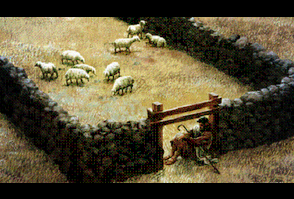I was reading one scholar recently who thought John 10 was so incoherent that he used it as his best argument for why the gospel could not have been written by one author. I didn't find that convincing but I found it interesting that the gospel that comes up next in the readings is John 10. The heading says The Good Shepherd And His Sheep. It is not quite right. Jesus is comparing Himself to a gate. What is going on?
We are the sheep here. We are kind of used to that. Still it is not a flattering comparison. Sheep were not smart animals. They were never safe. They were in constant danger from predators when they were out of their pen. When they were in their pen they were in danger of being stolen by humans thieves rather than animals. That is what is in view here.
Shepherds are the topic but Jesus is not the shepherd. Jesus is the gate. The shepherd is a human leader of Christians. Jesus is saying we need to be very concerned with how this shepherd gains control of the sheep. Does he use the normal method of accessing the sheep indicating he is sent by Jesus or does he use a sneaky method? Does he just show up and declare himself to be the shepherd?
Now do sheep follow just any shepherd? Some would for a while. Some would stubbornly stay in the pen. The ones that would follow would often stop following when they became sacred. They would miss the comforting voice of their regular shepherd. By that time the option of going back to the pen is no longer there. So often they would scatter and possibly be lost.
That can happen in church life as well. Some guy shows up with a strong personality and declares himself to be the shepherd of a new church. Some follow him. Some don't. Still when there is a spiritual crisis, when temptation or suffering get difficult, then they notice that this guy does not have authority to lead from anyone other than himself. At this point people are more likely to scatter than return to the fold. Some will come back but often that relationship has been poisoned to much.
Both Protestants and Catholics can see this happening. They can think of examples of charismatic pastors leading people astray and having them end up in a spiritual wilderness with a shepherd they don't trust. Many protestants would even agree that true leaders come from the church, from the body of Christ. False teachers tend to be self-appointed. They would disagree on which church but many would see being sent by their church as being very important to a pastor.
Certainly it was more important to my father than it is to my siblings. My father became a pastor in the early 60's when having the stamp of approval from the congregation meant everything. My siblings became pastors much later when that authority had broken down and far more people chose a church based on an affinity for the pastor rather than what any denomination said. So the switch in the protestant world has been away from caring about whether the shepherd came through the gate or not.
In the Catholic church there has been no such switch. Priests simply must be ordained in the church and approved for ministry by the local bishop. When you think of false shepherds the first thing they want you to do is question the church. So Jesus' words ring true that if the shepherd comes through the gate of the church, from the body of Christ, then we can trust his voice and follow him. When taken to its logical conclusion we arrive at the doctrine of apostolic succession. That is your bishop needs to come from a legit bishop and that bishop needs to come from a legit bishop and so on and so on, all the way back to the apostles.
The truth is that every protestant church has a false shepherd in their history. At some point they broke away from the church and followed someone who was essentially self-appointed. For many protestant denominations it happened several times in their history. Most churches are a split of a split of a split. Then why follow them into the wilderness?


FABULOUS reflection Randy!
ReplyDelete